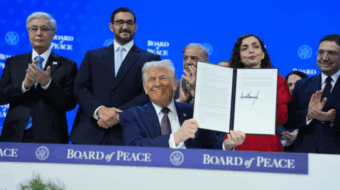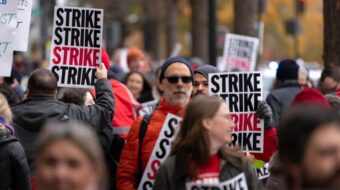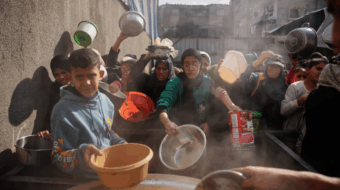HAVANA — Speaking July 18 to 300 visiting North Americans, Ricardo Alarcon, president of Cuba’s National Assembly, discussed the recently released report of Bush’s “Commission for Assistance to a Free Cuba.”
Alarcon reviewed sections of the report that call for undoing the gains of the Cuban Revolution and for “reshaping” Cuban society. To succeed in its quest to refashion Cuba to its own liking, the U.S. government will have to go to war, he said.
The report describes mechanisms, including a “Supreme Commission for the Restitution of Property Rights,” for restoring residential, commercial, and agricultural properties to their former wealthy owners.
“Settling the issue of expropriated properties will be critical to a transitional Cuban government,” the report reads. “It will be seen by many as a sign that Cuba will be open for normal business once again.”
The report includes a plan for U.S. families to adopt Cuban children orphaned during the expected difficulties ahead. It says a U.S. government agency, a Standing Committee for Economic Reconstruction, would manage the Cuban economy. A State Department “Transition Coordinator” would do for Cuba what L. Paul Bremer III did for Iraq.
Then, too, there are these items:
• The transitional government would no longer make pension payments. It would set up a “Cuban Elderly Cooperative” and old people would go to work.
• Humanitarian agencies and religious organizations would reorganize health care (currently high quality and free) under a fee-for-service system. A “Professional Policy Corporation,” emanating from the United States, would train, equip, and advise Cuban doctors and other health workers.
• The transitional government would revamp the police forces and would then do away with revolutionary leaders down to the local level, including heads of the Committees for the Defense of the Revolution, members of the Federation of Cuban Women, and labor leaders.
Even though the report was devised by low-level State Department functionaries and has yet to be reviewed by Congress, it reflects current U.S. policy, Alarcon said.
Joining Alarcon in the discussion, Oswaldo Martinez, president of the Economic Commission of the National Assembly, said the new laws would transform Cuban workers’ labor into a commodity. Universal education, subsidies for state enterprises, and special programs for handicapped children would be eliminated.
The report envisions Cuba moving into an economy based on agricultural exports and tourism. World-class scientific and technical research programs would disappear, along with industrial exports such as biomedical products.
Alarcon is confident that a unified Cuban people will defend their independence, wise as they are to the relationship between rule by corporations and the exploitation and suffering of masses of people. He predicts that, should the U.S. government attempt to put the commission’s recommendations into practice, an “interminable war” will ensue, one that extends into “future generations.”
In his address to the National Assembly on July 1, Oswaldo Martinez put the new document in perspective: “The report belongs to the same stock as the Platt Amendment, the Treaties of Commercial Reciprocity in the neo-colonial republic, the reports of the U.S. embassy in the times of Machado, and the honeyed letters to Batista [from Washington] in the midst of the murdering and torture of Cubans.”
The author can be reached at pww@pww.org
(See related story below)
******
Bay Area seeks Cuban ‘Sister Cities’
Special to the World
The Association of Bay Area Cities with the island of Cuba is convening monthly planning meetings to discuss the Bush administration’s escalation of aggression toward Cuba and to promote ways of expanding people-to-people relations.
The mission of such sister cities associations is to “promote mutually beneficial exchanges between U.S. individuals, organizations, and groups and their Cuban counterparts.”
The Bay Area group says 22 U.S. communities have joined with their partner cities in Cuba and have conducted hundreds of exchanges, including sending medical equipment and humanitarian, educational, cultural and technical aid. “Ultimately, we aspire to normalize trade and travel,” the group said.
For more information call the following numbers: Oakland: (510) 482-9241, Berkeley: (510) 548-6914, Richmond: (510) 236-7898, Santa Cruz: (831) 425-5231, or the Sister Cities with Cuba national office: (412) 563-1519.









